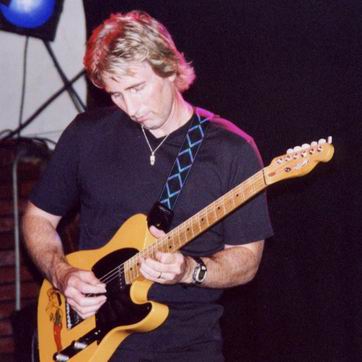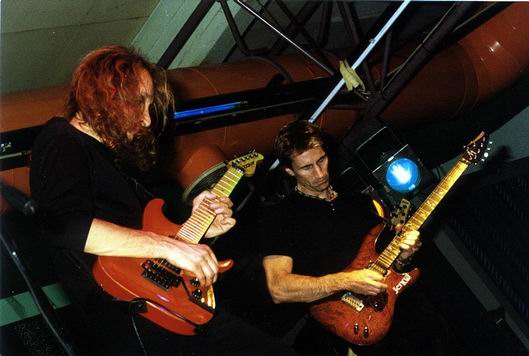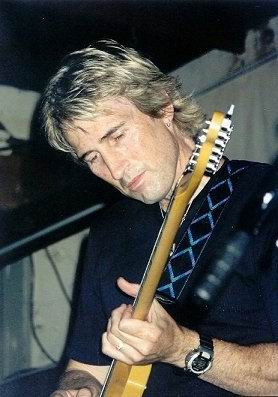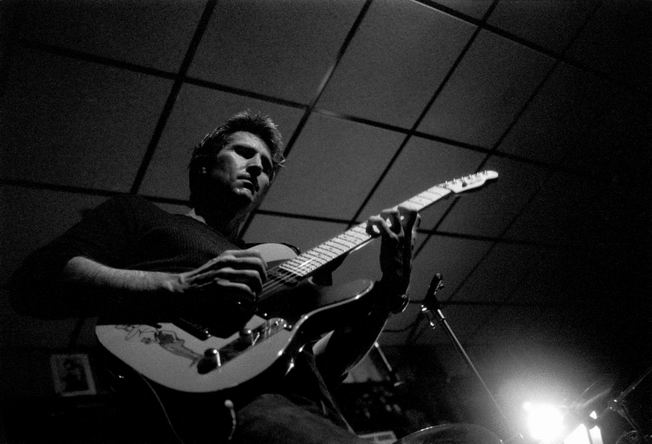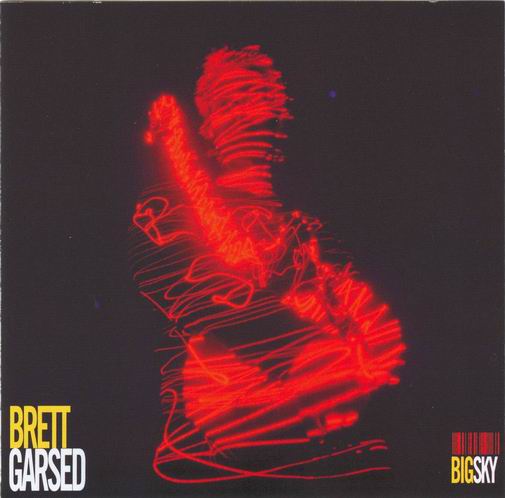Just before hitting the studio around january 2003 for the recordings of the Richard Hallebeek Project album featuring Shawn Lane and Brett Garsed, I thought this might be the right time to speak to Brett and try to give his new album ‘Big Sky’ a little boost by doing a printed interview for the Music Maker. I took some lessons from Brett around ’94 at M.I. and of course, he was featured on The Alchemists as well.
This interview was done Sunday, 19 January 2003. A shorter version of this interview was printed in the Music Maker june 2003 issue.
:: Copyright Richard Hallebeek and Music Maker 2003 ::
:: You’re in Australia now touring with John Farnham.
‘Yeah, that looks like it’s gonna go on probably.. ’till august.’
:: Wow, long tour.
‘Very long, but it’s great though. I love touring with John, he’s the best.’
:: How much do you play with him, is that like a few nights a week?
‘We generally did five a week. Usually we do three on-one off or two on-one off.
:: What kind of stuff do you play, his music?
‘Yeah, it’s all his stuff. It’s contemporary adult how you would call it.’
:: Any space for your guitar work when you play with John Farnham?
‘Oh yeah, he features the band quite prominently during the show, he’s great about that. I do a solo spot with him and there’s numerous solos throughout the show. Nothing lenghtly and too out of the cup but but he still gives me plenty of room.’
:: Your slide stuff suits his music probably, too.
‘Actually, the majority of it is slide, maybe a coincidence, I don’t know why, but..they just happen to choose songs that I do slide guitar on, so.’
:: Let’s dive into your past a bit. You came all the way from Oz to the U.S. to play with Nelson. How did you get that gig?
‘Well, that was through John Farnham. Nelson was being managed by an Australian guy, when they were looking for a guitar player to put the band together to do the album, the manager thought of me. So he invited me to fly over to the U.S. and audition for the guys, which I did and..we got along really well and I loved their songs, I knew it was gonna be a great band so I went for it.’
:: Then you got in touch with Varney, was that through the spotlight column?
‘Actually, no that was strange, it was Mark Varney and not Mike. He originally got in touch with me, ’cause I sent a tape to Mike and he put me in the spotlight column and that’s what I used to get the Farnham gig, it was the only thing in my resume at that time. I hadn’t done anything else other than that. You start sending tapes to people through the spotlight column beacuse that’s what you’re responsible to do and an English guy contacted me, we sort of became pen-pals and he really liked the demo tape that I sent in and he ended up sending the tape to Mark Varney. Because he heard Mark Varney had Frank Gambale signed to his label and by coincidence this other Australian guy shows up, so. We went back and forth with Mark trying to.. I kept talking to Mark about a budget and it seemed like it wasn’t really gonna happen. In the end TJ and I sort of put our heads together to do it ourselves.’
:: That was your first album ‘Quit Pro Quo’, right?
‘Yeah, that’s right. That just worked out better for us because you know, we were having a great time working together and also it means that TJ could engineer it also get a good studio because he was working at Cherokee studios at the time.
:: I really like Exempt, a cool album that was a bit overlooked, I feel. One side of the audience thought it was too poppy while the other side didn’t like the vocal tunes that were on there. But I still enjoy that album.
‘Yeah, we were really happy with that album. I think it was overlooked mainly because that was towards the end of Legato records and I think it just..but then of course, you know times where changing, too. Like that was ’94-’95 I think before that album really came out, the music scene was starting to change and so it was getting a bit harder to get reviews and articles with that album then we did with ‘Quit Pro Quo’. I guess it was just a sign of the times, I don’t know.’
:: The vocal tunes are top-production tunes, very well done. I think they could have been hits with the proper airplay and marketing.
‘Yeah, you know, we’ve always.. I guess it’s sort of a strange thing that if you’re know as a guitar player no one really takes you seriously as a singer. I speak more for TJ’s than me because he really is a world class vocalist. The funny thing is, like I’d often talk to people about Stevie Ray Vaughan, everybody is talking about his guitar playing, but nobody talks about his singing. I thought he was an amazing singer. There’s so many great guitar players-singers out there, that… like Clapton, I mean he’s a better singer then he is a guitar player.’
:: I think a lot of guitar players sing half-heartedly, so that’s why many people don’t take it that seriously.
‘Yeah, they sort of dabble in it, you know. But there’s so many great singer-gutiarplayers.. Steve Lukather, that guy is like a world-class singer. And has sang on most of their hits like a lot of their Toto hits.. everyone just remembers the guitar playing. It’s sad. People don’t have a very strong imagination.’
:: Did you manage to get the rights back for both Varney albums or are you still working on it?
‘Not yet, it’s just a question of raising the money. But Mark’s promised he’s not gonna sell ’em to anybody else, he’s gonna wait for me. It’s just like I said, I’m always.. a few thousand dollars shorter then Mark, so..it’s a long process, but one of these days, this year maybe I can raise the funds to do it.’
:: Let’s move on to your next album with TJ, ‘Under The Lash Of Gravity’. You recorded that album but it was never released.
‘Yeah, once again it was one of those budget things. We fnished that up I think in early ’97. We just started working in the studio, but we had no deal. Mark told us Legato records was over. And yet we had access to the studio, a new studio they had built at musicians institute. TJ was the head of the program but the thing was gonna be empty, for two weeks, so..he said let’s go in and record something. We just started working on this album, just having fun and we were doing a lot of digital editing at the time, we had a program called ‘sound designer’ which was released by digidesign. It was pretty exciting for us because at that time that was quite cutting edge. We started just piecing together our own loops, like making loops out of anything..drop a tambourine and make a loop out of it, you know. We created all these songs, we were sort of really getting influenced by the Nine Inch Nails album ‘The Downward Spiral’, so it was all sampling and everything. And then eventually T.J. met Virgil Donati and had him come in and play to the stuff and what Virgil did to it was just unbelievable.Then we started experimenting with vocals on the stuff, because we had trouble coming up with any sort of guitar oriented things that was really going to fit, plus we realized we created something quite unique, that album was way ahead of it’s time. I think it’s one of those rare case where it was just too ahead of it’s time. Like I’d sent it to people and they sort of scratched their heads and wouldn’t know what to do with it. And then two years later that style of editing and integrating like samples and loops into live tracks was pretty common, you know. I guess we just had the right ideas at the wrong time, or it was just in the wrong situation, I don’t know.’
:: So was that album ever released on a different label?
‘No, I did press up some copies and just sold them independently over the internet but as far as an official release, it never happened. Once again, it’s just one of those things, I’m just waiting for the funds to be able to do that. But it will happen. That album will eventually be available. When, I’m not really sure though.’
:: OK, moving on to Uncle Moe’s Space Ranch. How much of that album was recorded live?
‘Well, all the bass and drums are tracked…no, not really, the drums are tracked live, put it that way. Willis went over some scratch stuff in the studio with Chambers and played along but Willis eventually redid a lot of his stuff at home and.. TJ and I did all of that stuff overdub, we didn’t play live with those guys. It just didn’t..to our mind it didn’t seem to make sense to do it that way, because the songs were all pretty written, so it wasn’t like a jam album were you could just plug in and jam. Even though Varney likes his cd’s on Tone Center to be that way. We thought it would make more sense to write songs and have Willis and Chambers play to them. Otherwise, if they just do what they do, it might sort of be another Gary Willis record, you know.’
:: But did you guys play along during the tracking?
‘No, not at all.T.J. was running the board and I was faced with trying to direct traffic, you know as to what was going to happen next.’
:: OK, I just have the inside sleeve picture in my mind where you guys are sitting in the studio and seem to be jamming together.
‘Well, if you look closely at the picture you can see we’re all clowning around, we got microphones on electric guitars and silly things like that. It’s like, Varney just had to have a studio shot, so..allright, so he got his studio shot.’
:: The material is all yours and T.J’s, right?
‘Yeah, right. Except the second tune. The second song is a jam that Willis and Chambers did and Kinsey wrote the majority of that.’
:: What’s the story about that title, TJ@earthlink.net? An attempt in getting some mail traffic going for him?
‘Oh yeah (laughs). He just wanted to put his email address on there as a title to see what happened..’
:: And the address is still valid?
‘Oh yeah, that’s his email address allright. He just thought i’d be fun to see if anyone would write to it, that’s all.’
:: That tune has some of the coolest guitarsounds ever that sounds like a mega-whammy pedal. How was that accomplished?
‘That’s a great solo, that thing that he does on there. What he did was, he did a solo and then he took it to one of the masteringhouses here in L.A. and had them press it to vinyl. He made a vinyl album out of it. Then he went back and he put it on a turntable and scratched it like a DJ. And then he edited the scratched parts into the actual solo. It’s a really cool idea and I don’t think anyone has ever done that before, it’s quite unique. Great idea. It sounds like a whammy pedal or something, but it’s actually him on a turntable.’
:: Yeah, I was thinking about some modified whammy pedal..
‘We wanted that album to be really, really experimental, not like jam albums that they do. They just get monumentally boring to me.’
:: If there’s no songs, it gets boring after a while, no matter how good the players are, that’s true.
‘Well, that’s it, there’s no songs, there’s no production, you know. They just sort of go in there and jam for an hour and mix it and go home. We’re not in for that, we want to make something that there’s some point to being on it, you know?’
:: You had a nice telecaster tone on that album. What set up did you use there?
‘You know, I think for the most of the album, 99% of the album I actually used Scott’s… Scott Henderson’s got this Fender Bandmaster that was modified by Alexander Dumble. And man, it’s just a beautiful amp. Scott loaned that to us, so. And a friend of his loaned us a whole bunch of pedals. So we had tons of stompboxes and all sorts of things to choose from and that was just great, we had a ball doing that record.’
:: So all the guitar solos were also done at M.I., at the Tommy Tedesco studio?
‘No, we actually did those at TJ’s rehearsal space, T.J. has a rehearsal studio and we’d settle the guitar amps up there and did it all on the Pro Tools.
:: Again, there’s a hidden track on this album. What’s the story behind this one?
‘Ah yeah..! Well, I think the first thing is some tape from some band recital that Kinsey did while he was in school. And he wanted to put that on there. And then of course we would always find something ridiculous that we’ve done to put on there, so. It’s just that stupid sense of humour we have to put something strange at the end of those albums. You gotta have fun with the fact that it’s an independent release and you pretty much can do whatever you want. You gotta use that and not get stuck in some corporate, boring mentality that there’s gotta be 4 � minute songs in there.’
:: Did you have any trouble with hidden tracks when you were releasing the albums on Varney’s label in the past?
‘No, he didn’t care. As long as there was no profanity in there, things like worshipping the devil he’s cool, you know. As long as it was just good, idiotic humour, then he was fine with it. He has a good sense of humour. I was gonna call one song ‘Uluru’ which is the aboriginal name for Ayer’s Rock.’
:: That’s also a cool tune from Frank Gambale.
‘That’s right, that’s probably why I didn’t do it. And Mark said he didn’t wanna have that on there, because he didn’t wanna have any sort of spiritual reference on there. Or any culture other than Christianity, I guess.’
:: Next in your career came planet X. How did you end up in that band?
‘Hmm..how did I end up in that band?..I’m trying to think now..I just ended up meeting..that’s right, that’s what happened. Virgil and Derek where up at T.J.’s rehearsal space once again and they were writing the Planet X album up there. And I went up there one day, to like, grab a piece of equipment or something and said hello to everybody and.. Derek and Virgil said why don’t you stay and jam for a while we’ll see if we can write something. So I plugged in and we did that and then in the end Derek asked me if I would play on the album, so..that’s how it all came about. I ended up doing two gigs with the band.’
:: Wow, just two? I was under the impression you did a lot more with that band.
‘Yeah, I did two shows. But I was already in another band in L.A. called ‘Jenna Music’ which was a pop band. And I was comitted, you know, I invested like over a year in my life to that band so I couldn’ t play with them if I was gonna play with Planet X. I guess it was one of those things where I had two great things going and I had to choose one.’
:: I really liked that first Planet X album. The tunes on the other albums were a bit weaker to my taste.
‘I like the writing on the first one, too. I’m not into the… well I couldn’t say I’m not into it, but I’m not as fond of the second and thirsd as I am of that first one. It has nothing to do with my playing, it’s all about the writing. I think Derek and Virgil did a great job of writing on that one.’
:: It’s really bad that your guitar is so soft in the mix.
‘Yeah, I got killed on that album. It was ridiculously low, to mix it like that is almost embarrassing to whoever mixed it, I guess it was. That happens to me alot, I get crushed in the mix, I don’t know what it is.’
:: What was the recording process like for Planet X? Did you record at Derek’s studio?
‘Yeah, we did it up at Derek’s place. And I just got it piece by piece, I just had Derek show me the riffs and I did my best to get them done as quick as possible. So it was all an overdub situation, really tough stuff to me, I don’t think that’s one of my strong points, memorizing lots of intense unison parts and some of those parts were really hard for me, ’cause I’m not much of a picker, you know.’
:: Derek likes pickers I guess.
‘I think it sounds better, you know. That’s why I think Tony is great in the band, he’s got the great picking chops, you know. All that real intense unison stuff that’s supposed to be tight, I think it sounds better if you pick it, really. Being a legato guy it’s a little harder to get the definition out of the notes. It was an incredibly challenging gig technically for me, but I had a ball doing it, I just loved it.’
:: You had to loan a 7 string from Wendy Levin?
‘Yeah, Wendy had the universe 7 string, so I had to grab that ’cause Derek said he wanted to…I mean, I had a great amount of fun doing the live gigs you know, ’cause I never played heavy music on stage before I never done that before. Mainly been in pop bands my whole life. Great to play really heavy dark riffs in low B.’
:: What kind of amps did you use for that album?
‘That was the Diezel. At that time I had the Diezel amplifier. Are you familiar with those things?’
:: Yes, I have an endorsement with Diezel amps now. I have the stereo head.
‘Great, so you know exactly what I’m talking about I’ve been using the amp for over a year now, I love it. ‘It was a beatiful amp, I think I just ended up discovering that it’s almost too much amplifier for me, you know. It was so powerful, I wasn’t really getting the benefit out of the amp, so I ended up sort of swapping it for a Bogner. The Bogner sort of suited my style a little more, the Diezel was a little too aggressive for me.’
:: Is that the Bogner exctasy?
‘Yeah the bottom of the line exctasy, it’s not the real fancy one.’
:: I know the Diezel amps are real fancy expansive in the U.S. Over here it’s not that bad luckily, since they’re from Germany.
‘Oh yeah, they’re up there. I got the artist’s deal at about $2700.-.’
:: Hmm..yeah they’re about that price brand new here I guess.
‘Brand new they’re like $4000.- or something. I think the best amp I’ve ever tried is that Fender of Scott, you know. I love that thing. It’s not really good for live playing since it’s very low-wattage. It’s only like 30 watts, so..not really loud.’
:: Playing Brian Moore guitars?
‘Yeah, I still have the Brian Moore. I’ll never get rid of that, that’s a beautiful guitar. For some reason I’m just drawn to that tele, you know. That’s what I keep playing, I don’t know why. I feel like that guitar brings out the best character in me.’
:: It has a lot of personality.
‘Yeah, that’s what it is.’
:: I have a Brian Moore too, but I have kind of a problem with the radius of the neck. I don’t like the Fender radius, but unfortunately, they only make ’em like that.’
‘Oh, right.., they have like a rounded radius on it.. That’s funny, ’cause..which model have you got?’
:: The MC-90.
‘Ok, I came in really early in the store and I got the MC-1, the molded graphite one, I think the radius on that one is quite straight, quite flat, so..but that really suited me, I love the way that felt. The actual neck is quite large, but then compared to the neck I’ve got on that tele, the neck on the tele is like a baseball bat. Which I’ve actually gotten really used to, I like it.’
:: Are you still working on your legato playing or are you at a point where you don’t think or work on that stuff anymore but just play?
‘I have to be honest, I’m not really working on playing from a technical perspective and I suppose that’s, I don’t know I never really approached my playing from a technical perspective. Any technique I have is sort of like.. I never sat down and really thought: ‘now I’m really gonna make my chops happening’, you know. ‘Cause I’m not about that, it’s not just about chops to me. If I’m not really playing something that I can relate to emotionally, it’s pointless. I guess I’m working more on my playing from a conceptual level, trying to get better at improvising…good ideas, I guess. That’s the main thing. I’m just trying to play..I guess every time I’m trying to play, I’m trying to play something memorable and… that has a point.’
:: How do you work on that? Do you sit down and try to learn some phrases from records, or just improvise?
‘To be honest, I just try to listen to music and when something reaches me in that way, in that emotional level, where I’m not even really thinking about technical execution and what someone’s doing and anything like that, I’m just like ‘man, that was the right thing at the right time’, that’s what I listen to. The other guitarist in John Farnham’s band, his name is Stuart Frazer..and he’s that guy. He plays the right thing at the right time. Complete improviser you know, beautiful player. He’s just one of those players. Henderson’s like that to me. Ric Fierabracci is playing me a lot of Michael Brecker stuff, it just seems to be perfect composition in an instant and that’s what I’m looking for. I guess what I ought to do is expanding my musical mind rather than any technical stuff.’
:: The legato thing that you’re talking about on your instructional vid. is very personal. You’re filling up scales with chromatic passing tones and it has become a sound very much of your own. When you hear somebody do that it’s ‘allright, that sounds like Brett!’
‘It’s interesting, I was talking to somebody about that yesterday and I have a hard time with playing outside. I’m not really good at that. I’m so drawn to melody and being melodic in a rock sense that it’s hard for me to play outside. Other people make it sound great but I’m not very good at it. SO the way I get more of an outside sound is by using chromaticism. I’m still essentially playing diatonically but it’s just the notes in there that are interesting, so that’s the way I have a bit of fun playing outside.’
:: What’s happening with T.J.? He’s quite absent from the guitar scene.
‘Yeah he’s been more into the recording thing and he loves to sing so he’s really into his singing. We’re hoping to do another Uncle Moe’s record later in the year. That’s pretty much on the schedule, we have to sort of wait ’till everybody is available.’
:: Is he playing in some other band?
‘He’s been playing in some rock bands around town just to have fun singing mainly you know. But he still practises all the time, but he’s not like.. I think it’s because he’s got this other career as a recording engineer that takes up the majority of his time. Plus he has a little girl now and his wife got a baby, he’s a dad now. It’s good for him to be at home rather then careering around the world like me, touring and everything.’
:: What’s life like for a guitarplayer in L.A. nowadays, must be pretty rough.
‘It’s pretty challenging, yeah (laughs) I’ll say that. It’s been challenging for everybody ever since the 9-11 terrorist attack it pretty much changed the music business..it changed everything. But the music business felt it quite strongly, a lot of tours got cancelled a lot of projects that were on the shelf got cancelled. I was a victim of that..Ric and I were both a victim of that, we were in a situation with an artist called Jennifer Page, we had two months worth of work lined up and after 9-11 all that came to an end. We were all left without jobs and it was ugly it was a terrible time for me I was so broke, I was selling gear as well.Thank goodness the John Farnham tour came up and John, once again, saved my butt. But it’s very challenging over here, there’s sort of a select few people that do all the work and not letting go of it. It’s very hard to get new work. I guess it’s always been that way in the music business, I can’t remember a time when there’s was more work then there were musicians. I guess it’s just the same thing.’
:: I get the impression that a lot of people are moving out of the U.S. back to their native country..
‘My wife and I are moving back to Australia, mainly because I just got more work there. It’s sort of ridiculous to live here in the U.S. and have all the work in Australia. I think I’d rather live in Australia and visit the U.S. It has nothing to do with the war or anything like that, I’m not letting that effect my decision.’
:: Are you still teaching at M.I. over there?
‘Well, not really, ’cause ever since this tour started I had to leave. It was great, teaching at M.I. but obviously, I’d rather be out touring. Teaching is fun and all, but touring and doing my own thing is where it’s at.’
:: Any good players at G.I.T nowadays?
‘Ah always. There’s always great players there. Just the faculty is always incredible, so. And yeah, there’s a lot of great players. There’s always a few where you just sort of think:’why are you here?’ you now. (laughs) There’s one guy Raphael Morrera, he graduated a couple of years ago and Raphael was one of those players, he’s from Brazil and he’s one of those guys I just think ‘why are you even here?’ Well, I thought the same thing about you and Antti, you know.’
:: Really?
‘It’s like, what are you doing here? I guess you’re just here to meet people, you know. It’s stuff that anyone could teach you. Raphael was like that and he’s out touring with Pink and Christina Aguilera, he’s doing great.’
:: I think I heard Antti speak about him a few times.
‘Yeah, I’m sure. He’s a fantastic player. Great fusion player and pop player, he’s just a brilliiant musician. He’s definitely gonna be a guy to look out for.
:: Do you have any plans for doing a new instructional video?
‘Yeah I’d like to, you know. I’d like to do something. I think obviously if I’ll do one, it’ll be independant. I’d rather just do it like that. Release it and sell it myself. I guess it’s just a question of finding the financial means of doing it, you know. It’s so hard to get any support these days. I did shop around to various labels trying to get a deal for my solo record. I approached Mike about it. But all Mike wants to do is get the big name players on there and make lots of drum and bass solos, you know. I have no interest in doing that, I wanna make an album which hopefully would have some songs on it that people might wanna listen to for more then a month. Who honestly really listens to a lot of those albums for any more then a couple of weeks? I mean, there’s no songs on there. I approached Favored Nations and they completely just look like the most unprofessional label in the world, they’ve got some ridiculous email that’s supposed to come from Steve Vai which I don’t believe to this day. So in the end I just did it myself. We’ll see what happens you know. I’m so much more happy with doing it myself anyway.’
:: Copyright Richard Hallebeek and Music Maker 2003 ::
